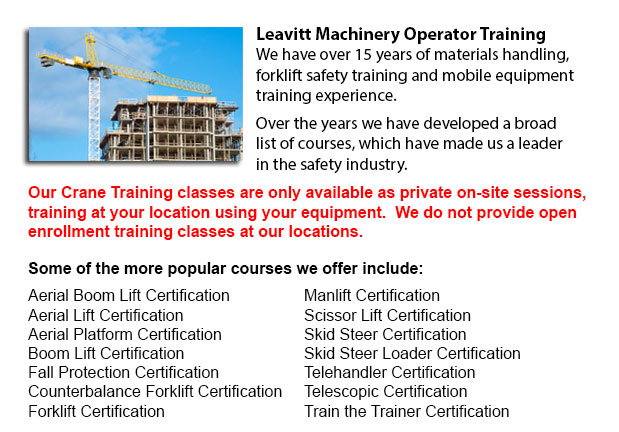
Crane License Markham - The operator of a crane has to have been certified with a crane operator certification or license. In order to practice as a crane operator, the qualifications are considered mandatory. Obtaining a license involves training and final assessment and examination.
The operation of heavy machinery, such as cranes, requires safety training. Licensing for crane operators combines specialized training programs and on-the-job supervised work. These training programs are offered by industry training and certification organizations. The content of crane operator training programs can vary depending on the requirements and laws of the local industry.
Training and certification can be provided for various kinds of cranes, like overhead cranes, mobile cranes, articulator cranes and tower cranes. Overhead cranes are usually used in manufacturing. Mobile cranes transport heavy machinery to sites where the job is to be performed. Articulator cranes are used to be able to load materials and equipment onto truck beds and various heavy machinery. The largest type of crane is the Tower cranes, usually located in large sea ports.
The supervisor of the crane department would normally have the authority to offer basic hands-on crane training, within the manufacturing trade. After the practical part, the trainee might have to pass a course. Upon successful completion of the course, the trainee would be licensed or certified.
Simulated crane operator training is provided in several industrial environments, that allow operators the ability to gain hands-on skills without putting other employees and equipment at danger. The simulated environment offers a set of virtual activities utilizing a simulated crane, like for example realistic controls. By mastering crane operation during simulated training, the operator could operate real cranes on the job.
To be able to regularly upgrade and update their skills, certified and licensed crane operators ought to participate in continuing education. Continuous crane operator training is usually recommended for technicians so they could stay abreast of updates in crane technology and safety features.
-
Crane / Overhead Crane / Self-Erect Crane / Truck Mounted Crane / Hydraulic Cranes Training in Markham
Bridge cranes or overhead cranes are a kind of industrial material handling crane making use of a hook and line apparatus that runs on a horizontal beam running along two widely separated rails. Many overhead cranes could be seen inside a long factor... More -
Manlift Ticket Markham
Manlift Ticket Markham - The Manlifts and Elevated Platforms program provides training on the regulations, rules and correct application of safe operating procedures and work practices involved in everyday activities for individuals who work with thi... More -
Aerial Lift Train the Trainer Markham
Aerial Lift Train the Trainer Markham - The Aerial Lifts Train the Trainer Certification Program will teach trainers how to effectively train operators in safe industrial mobile equipment operation. Trainers are given in-depth instruction on aerial l... More -
Loader Operator Training Markham
Loader Operator Training Markham - Loader Operator Training - Within North America, lift truck operator training is required to be able to prevent workplace injuries and accidents. Certain forklift training would be provided to be able to offer forkl... More -
Aerial Boom Lift Ticket Markham
Aerial Boom Lift Ticket Markham - Aerial lift trucks can be used to accomplish many unique duties done in hard to reach aerial spaces. A few of the duties associated with this style of jack include performing daily repair on buildings with high ceili... More -
Boom Lift Operator Training Markham
Boom Lift Operator Training Markham - The cherry picker work platform is a type of work platform, that will usually have a bucket or platform at the hydraulic lifting system's end. The machine is likewise called a boom lift, man lift, hydraladder or... More -
Boom Lift License Markham
Boom Lift License Markham - Just fully qualified individuals must operate an aerial boom lift. Qualification can be obtained through a combination of classroom sessions and practical training with the particular kind of aerial lift that will be used... More -
Telehandler Training Courses Markham
Telehandler Training Courses Markham - The employer has the responsibility to make certain that their workers are trained to work proficiently with telehandler machines. The staff have to be assessed for their skill to utilize the equipment. If defic... More

Forklift Training Markham
TOLL FREE: 1-888-254-6157
Markham, Ontario
forklifttrainingmarkham.com
Email Us
About Us


